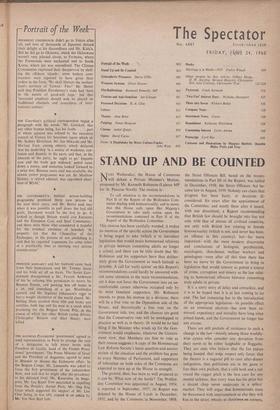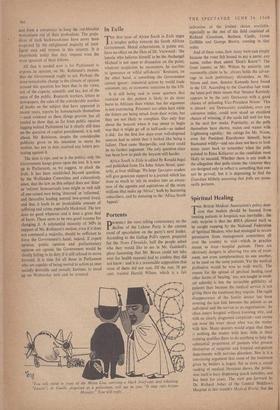STAND UP AND BE COUNTED
NEXT Wednesday, the House of Commons will debate a Private Member's Motion, proposed by Mr. Kenneth Robinson (Labour MP for St. Pancras North). The motion is: To call attention to the recommendations in Part II of the Report of the Wolfenden Com- mittee dealing with homosexuality; and to move, that this House calls upon Her Majesty's Government to take early action upon the recommendations contained in Part II of the Report of the Wolfenden Committee.
This motion has been carefully worded; it makes no mention of the specific action the Government is being urged to take (which is to introduce legislation that would make homosexual relations in private between consenting adults no longer a crime), and there can be little doubt that Mr. Robinson and his supporters have thus deliber- ately given the Government as much latitude as possible. A call for 'early action' on this Report's recommendations could'hardly be answered with- out some attention to the main recommendation, yet it does not force the Government into an un- comfortable corner otherwise occupied only by its most fanatical supporters. Mr. Robinson intends to press his motion to a division; there will be a free vote on the Opposition side of the House, and theoretically a free vote on the Government side, too, and the chances are good that the Conservative vote will be unwhipped in practice as well as in theory. (It would be no bad thing if the Minister who winds up for the Gov- ernment would emphasise, whatever the Govern- ment view, that Members are free to vote' as their reason suggests.) A copy of the Homosexual Law Reform Society's latest question-and-answer review of the situation and the problem has gone to every Member of Parliament, and supporters of toleration on both sides of the Commons are expected to turn up at the House in strength.
The ground, then, has been as well prepared as it can be. What now of the battle? The Wolfen- den Committee was appointed in August, 1954; it reported in September, 1957; its Report was debated by the House of Lords in December, 1957, and by the Commons in November, 1958; the Street Offences Bill, based on the recom- mendations in Part 111 of the Report, was tabled in December, 1958; the Street Offences Act be- came law in August, 1959. Nobody can claim that progress has been hasty, or decisions ill- considered. Six years after the appointment of the Committee, and nearly three after it issued, with one dissentient, a Report recommending that British law should be brought into line not only with that of almost all civilised countries, not only with British law relating to female homosexuality (which is not, and never has been, an offence in this country), but—far more important—with the most modern discoveries and conclusions of biologists, psychiatrists, sociologists, churchmen, welfare workers and penologists—even after all this time there has been no move by the Government to bring in legislation that would remove so potent a source of crime, corruption and misery as the law relat- ing to homosexual offences between consenting male adults in private.
It it a sorry story of delay and cowardice, and it is to be hoped that it is at last coming to an end. The last remaining bar to the introduction of the appropriate legislation—its possible effect on an imminent election—has now been re- moved; expediency and morality have long since joined hands, and the Government no longer has any excuse.
There are still pockets of resistance to such a change in the law—mainly among those worldly- wise cynics who consider any deviation from their norm to be either laughable or floggable. They are ones who believe that the fox enjoys being hunted, that wdgs respect only force, that the theatre is a sugared pill to cure after-dinner indigestion, that politicians are in the game to line their own pockets, that a cold bath and a run round the rugger pitch is the best cure for any mental sickness, that every man has his price but a decent chap never undercuts in a sellers' market. They will argue that homosexuals must be threatened with imprisonment or else they will kiss in the street, whistle at choirboys on corners, and form a conspiracy to keep the red-blooded womanisers out of their professions. The preju- dices of such backwoodsmen have never been respected by the enlightened majority of intel- ligent men and women in this country. It is improbable today that they impress even the most ignorant of their fellows.
All that is needed now is for Parliament to express its opinion, on Mr. Robinson's motion, that the Government ought to act. Perhaps the most remarkable change in the climate of opinion around this question has been that in the views, not of the experts, scientific and lay, but of the mass of the public. Research workers, letters to newspapers, the sales of the considerable number of books on the subject that have appeared in recent years, reports by homosexuals themselves —such evidence as these things provide has all tended to show that, so far from public opinion lagging behind Parliament (as it clearly still does on the question of capital punishment), it is well ahead. Mr. Robinson, despite the considerable publicity given to his intention to move his motion, has not to date received any letters pro- testing against it.
The time is ripe, and so is the public; only the Government hangs green upon the tree. It is now up to Parliament, as we suggest, to pluck the fruit. It has been established beyond question, by the Wolfenden Committee and exhaustively since, that the law on this subject does not 'deter' or 'reform' homosexuals (one might as well talk of one-armed men being 'deterred' or 'reformed,' and thereafter leading normal two-armed lives), and that it leads to an incalculable amount of suffering and crime, especially blackmail. The law does no good whatever and it does a great deal of harm. These seem to be two good reasons for changing it. A substantial minority of MPs in support of Mr. Robinson's motion, even if it does not command a majority, should be sufficient to force the Government's hand; indeed, if expert opinion, public opinion and parliamentary opinion are agreed, the Government would be clearly failing in its duty if it still refused to move forward. It is time for all those in Parliament who are capable of being moved to action at once socially desirable and morally humane, to stand up on Wednesday next and be counted.
'You will stand in from of the Mona Lisa, carrying a black brief-case and whistling "Louise"; de Gaulle, disguised as a policeman, will say to you, "It may rain before Monday." You will reply . . .•





















 Previous page
Previous page